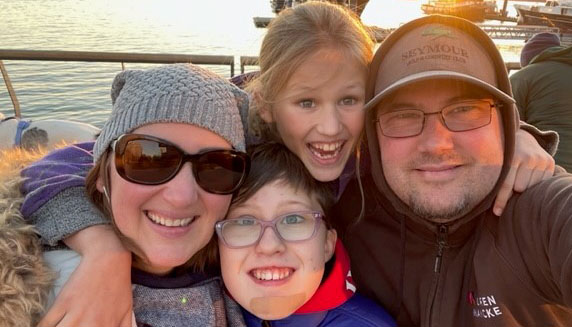A caregiver draws on her lived experience to help shift future health providers’ assumptions about patients and families.

Mandy Young (left) with her family.
“How might you get your patients to share how they are really feeling? What might you do to make a patient feel comfortable? Why might they not want to accept your help?”
These are just a few of the questions that Mandy Young asks her students to think about as part of her role as a health mentor with Patient and Community Partnership for Education (PCPE) in UBC Health.
Angela Towle, an associate professor of medicine and scholar with the Centre for Health Education Scholarship, and William Godolphin, a professor emeritus of pathology and laboratory medicine, are co-directors of PCPE. Together with Cathy Kline, PCPE research manager, they are creating opportunities for students in the health disciplines to engage with and appreciate the unique lived experiences of patients and families who navigate the health system and manage chronic conditions on a regular basis—a key step in practicing patient-centered care.
Every year, PCPE pairs mentors with groups of four students from different health professions. Students meet with their mentor once monthly to learn from them ideas for how they can best support their patients’ complex health needs, individually and as part of a health care team.
“The learning is twofold,” Young explains. “They learn from me, and they also learn about each other’s disciplines and how they function as a multi-disciplinary team.”
Young, whose eldest child lives with a rare disease, became a health mentor eight years ago. “I joined the health mentors program at UBC because I was hoping to make it easier for folks on the journey after me,” she recalls. “That was my motivation—to give back to the community.”
With each new cohort of students, Young starts by challenging the assumptions they may have formed about their role or the people they will support. “We need to remove those stereotypes. You can’t do your best work as a health provider if you’re stereotyping families,” she shares. “And I can’t do my job as a parent if I’m not feeling understood.”
Drawing on examples from her family’s experience, she impresses upon her students how important their voice can be, no matter their specialty. “I often ask them to consider, ‘where can you use your influence’?” She shares examples of memorable encounters with her family’s physiotherapist, speech language pathologist and pharmacist to illustrate their potential for impact.
“I hope the stories I share will percolate in their mind and then, when they are in practice, that lightbulb comes on and they think, ‘Oh, this is what she meant!’” she says.
Donations to support PCPE help diversify and scale up the program to meet the growing demand for patient and community involvement in education across the university. In the coming year, the PCPE team plans to expand their outreach and recruit more patients and caregivers to become health mentors and share their diverse experiences with students.
Young is excited to see the program continue to grow. “To really learn about a patient’s experience, health care providers need to engage directly with a patient. And the best time to make those connections is before beginning a busy practice,” she advises. “That’s why we do education in this way—our voices have impact. Health mentors have the opportunity to shape students, which hopefully translates into benefits for patients and their families.”
If you are interested in learning more about Patient and Community Partnership for Education or wish to make a gift, please contact Olivia Peters (she/her) at olivia.peters@ubc.ca.